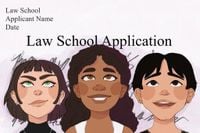Law school applications are surging, with a remarkable 21% increase for the 2025 school year compared to the previous year, according to data from the Law School Admissions Council. This trend has sparked discussions among educators and potential law students about the factors driving this interest and its implications for the legal profession.
Aaron Taylor, Senior Vice President and Executive Director at the nonprofit AccessLex Institute, attributes this spike in applications primarily to the strong job market for law graduates. The National Association of Law Placement (NALP) has reported impressive employment statistics over the past five years, highlighting that new law graduates are securing jobs at unprecedented rates. "New law graduates have been employed in record proportions, with median salaries that have broken records as well," Taylor noted.
Indeed, NALP's recent report showcased what Taylor described as "incredible outcomes" for the Class of 2023. The employment rate for law graduates reached approximately 93%, the highest in recorded history. Additionally, 82% of graduates found jobs that required a law license, a significant indicator of the desirability of these positions. Salary figures also soared, with the median salary for 2023 graduates hitting $90,000. Such data reinforces the notion that a law degree is a worthwhile investment, prompting more individuals to consider pursuing legal education.
However, the surge in applications signals a potentially competitive admissions cycle. Taylor emphasized that the intensity of this cycle will largely depend on how law schools respond to the increased demand. If institutions choose to maintain their current class sizes, competition for admission and scholarships will become noticeably fiercer. He advised aspiring law students to submit their application materials early and ensure they present their best selves.
On the other hand, while the influx of applications is favorable for law schools, it also raises concerns. Taylor expressed caution about the sustainability of this trend, particularly as some law firms have begun to cut summer associate hiring to its lowest level in over a decade due to "uncertain demand" for legal services. He warned that if law schools expand their class sizes in response to current demand, they might face challenges when the job market inevitably fluctuates. "My hope is that law schools are judicious and cautious in setting enrollment targets, remaining cognizant of the risks of near-sighted optimism," he said.
In a related development, a survey conducted by Kaplan on March 18, 2025, revealed that pre-law students have strong opinions regarding the use of artificial intelligence (AI) in law school admissions essays. The survey garnered over 300 responses, focusing on whether applicants should use AI, the necessity for transparency from schools using AI in evaluations, and concerns about potential AI bias.
A significant 89% of respondents believed that law schools should disclose their use of AI in evaluating applications. Furthermore, 80% expressed concerns that AI could unintentionally perpetuate bias in admissions processes. Matthew Bui, an assistant professor at the School of Information and Digital Studies Institute, elaborated on the issue of bias in AI, stating, "In the ethics course that I teach, bias is everywhere. If data is skewed and then input into these models, those biases might get reproduced and even amplified through broader use."
Carson Byrd, an associate research scientist in the Center for the Study of Higher & Postsecondary Education, echoed these sentiments, warning that biases in the data used to train AI models could adversely affect applicants. He pointed out that while AI might streamline the evaluation process for universities with high application volumes, it could reinforce existing inequalities in admissions outcomes.
At the University of Michigan Law School, the admissions team has opted not to detect AI usage in essays. Instead, they require applicants to sign a certification confirming that their work is original and unaided by AI. Senior Assistant Dean Sarah Zearfoss stated, "We don’t attempt to detect it. We do ask… that you sign a certification pledging that you have not used AI to draft your essay among other requirements that everything is your own work." This approach relies heavily on the integrity of applicants.
Amit Schlesinger, Kaplan's Executive Director of Legal and Government Programs, emphasized the importance of the admissions essay, stating that while LSAT scores hold more weight, a poorly written essay can negatively impact an applicant's chances. He noted that essays provide a unique opportunity for students to share their personal stories and stand out in the application process.
Second-year law student Kristia Postema mentioned that applicants could manipulate AI tools to create essays that appear human-written. "A lot of times, they’ll ask AI to write something in a specific tone… and I think that makes it sound a little more genuine," she explained. As AI continues to gain traction, Schlesinger stressed the need for transparency in admissions policies, encouraging students to reach out to admissions offices if they are uncertain about the use of AI.
While Zearfoss acknowledged that the University of Michigan Law School currently prohibits AI usage, she also hinted at the possibility of future changes in policy. "I evaluate them every year, but not right now," she said. This evolving landscape of law school admissions, marked by increasing applications and the integration of AI, poses both opportunities and challenges for prospective law students.
As the legal education landscape shifts, it remains crucial for applicants to stay informed about trends and adapt their strategies accordingly. The combination of a strong job market and the potential implications of AI in admissions processes will undoubtedly shape the future of legal education.






